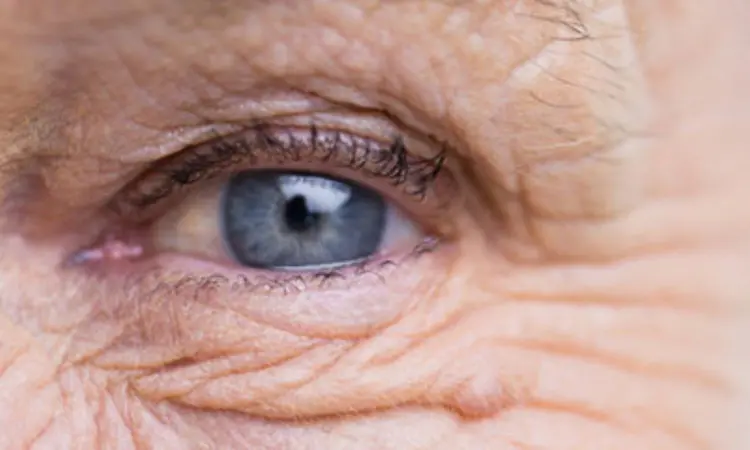- Home
- Medical news & Guidelines
- Anesthesiology
- Cardiology and CTVS
- Critical Care
- Dentistry
- Dermatology
- Diabetes and Endocrinology
- ENT
- Gastroenterology
- Medicine
- Nephrology
- Neurology
- Obstretics-Gynaecology
- Oncology
- Ophthalmology
- Orthopaedics
- Pediatrics-Neonatology
- Psychiatry
- Pulmonology
- Radiology
- Surgery
- Urology
- Laboratory Medicine
- Diet
- Nursing
- Paramedical
- Physiotherapy
- Health news
- Fact Check
- Bone Health Fact Check
- Brain Health Fact Check
- Cancer Related Fact Check
- Child Care Fact Check
- Dental and oral health fact check
- Diabetes and metabolic health fact check
- Diet and Nutrition Fact Check
- Eye and ENT Care Fact Check
- Fitness fact check
- Gut health fact check
- Heart health fact check
- Kidney health fact check
- Medical education fact check
- Men's health fact check
- Respiratory fact check
- Skin and hair care fact check
- Vaccine and Immunization fact check
- Women's health fact check
- AYUSH
- State News
- Andaman and Nicobar Islands
- Andhra Pradesh
- Arunachal Pradesh
- Assam
- Bihar
- Chandigarh
- Chattisgarh
- Dadra and Nagar Haveli
- Daman and Diu
- Delhi
- Goa
- Gujarat
- Haryana
- Himachal Pradesh
- Jammu & Kashmir
- Jharkhand
- Karnataka
- Kerala
- Ladakh
- Lakshadweep
- Madhya Pradesh
- Maharashtra
- Manipur
- Meghalaya
- Mizoram
- Nagaland
- Odisha
- Puducherry
- Punjab
- Rajasthan
- Sikkim
- Tamil Nadu
- Telangana
- Tripura
- Uttar Pradesh
- Uttrakhand
- West Bengal
- Medical Education
- Industry
Alzheimer's Medications Reduce Age-Related Macular Degeneration Risk: JAMA

A recent study found that medications used to treat Alzheimer's disease may hold promise in reducing the risk of age-related macular degeneration (AMD). The findings were published in the Journal of American Medical Association.
Age-related macular degeneration is a significant threat to vision with inflammation in the macula believed to contribute to its development. Alzheimer's disease medications, known as acetylcholinesterase inhibitors (AChEIs) with their anti-inflammatory properties was employed to explore whether these drugs could alter the risk of AMD.
This retrospective cohort study was conducted at healthcare facilities within the US Department of Veterans Affairs and spanned from January 2000 to September 2023. The study included a total of 21,823 veterans who were diagnosed with Alzheimer's disease between the ages of 55 and 80 without a preexisting AMD diagnosis in the Veterans Affairs database.
The exposure under scrutiny was the prescription of AChEIs for Alzheimer's treatment. The results unveiled through a propensity score-matched Cox model that indicated a critical association. For each additional year of AChEI treatment there was a 6% lower hazard of AMD observed as reflected in a hazard ratio of 0.94 (95% CI, 0.89-0.99).
This observational study presents a modest reduction in AMD risk among veterans with Alzheimer's disease who receive AChEIs. While these findings offer promise, the outcomes emphasize the need for caution and to underline the necessity of randomized clinical trials to establish a concrete cause-and-effect relationship. Further research is urged to explore these findings across diverse populations to validate their broad applicability.
This study highlight on a potential dual benefit of Alzheimer's medications and also sets the stage for more targeted investigations by potentially unlocking new avenues in the prevention and treatment of age-related macular degeneration.
Source:
Sutton, S. S., Magagnoli, J., Cummings, T. H., Hardin, J. W., & Ambati, J. (2024). Alzheimer Disease Treatment With Acetylcholinesterase Inhibitors and Incident Age-Related Macular Degeneration. In JAMA Ophthalmology. American Medical Association (AMA). https://doi.org/10.1001/jamaophthalmol.2023.6014
Neuroscience Masters graduate
Jacinthlyn Sylvia, a Neuroscience Master's graduate from Chennai has worked extensively in deciphering the neurobiology of cognition and motor control in aging. She also has spread-out exposure to Neurosurgery from her Bachelor’s. She is currently involved in active Neuro-Oncology research. She is an upcoming neuroscientist with a fiery passion for writing. Her news cover at Medical Dialogues feature recent discoveries and updates from the healthcare and biomedical research fields. She can be reached at editorial@medicaldialogues.in
Dr Kamal Kant Kohli-MBBS, DTCD- a chest specialist with more than 30 years of practice and a flair for writing clinical articles, Dr Kamal Kant Kohli joined Medical Dialogues as a Chief Editor of Medical News. Besides writing articles, as an editor, he proofreads and verifies all the medical content published on Medical Dialogues including those coming from journals, studies,medical conferences,guidelines etc. Email: drkohli@medicaldialogues.in. Contact no. 011-43720751


